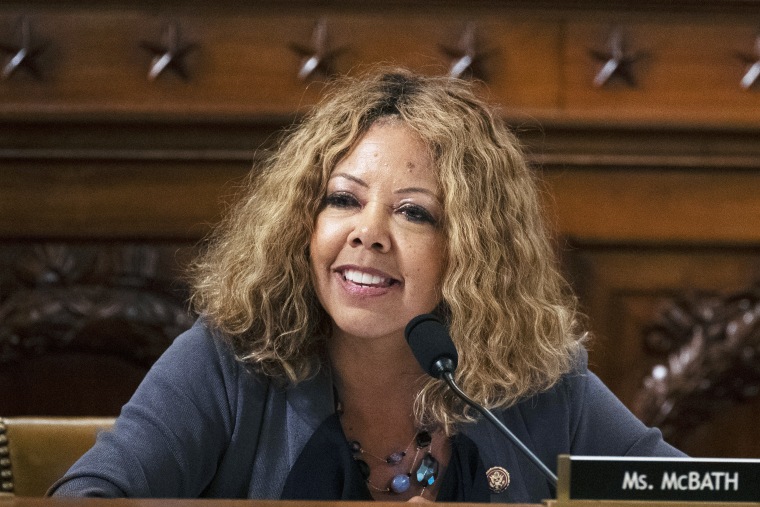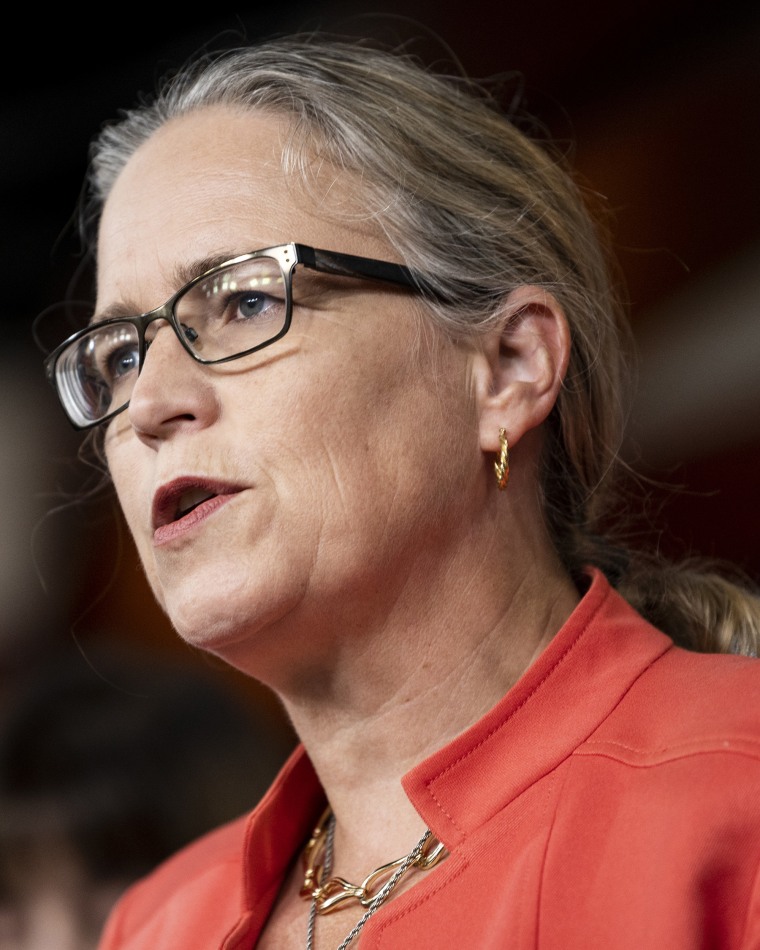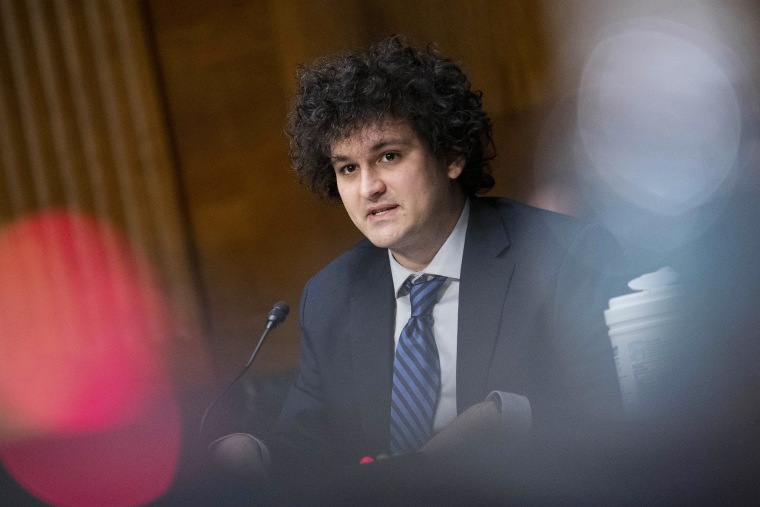WASHINGTON — In many ways, the Georgia Democratic primary fight between two sitting House members — Reps. Carolyn Bourdeaux and Lucy McBath — is a pretty even matchup. The biggest difference might be $2 million in cryptocurrency backing.
Both Democrats have been aggressively fundraising and racking up endorsements. McBath rocketed to prominence as a gun control activist after her 17-year-old son was fatally shot a decade ago. Bourdeaux says her newly drawn district, which forced the two colleagues to run against each other, is comprised of 60 percent of her old district.
But McBath has something Bourdeaux does not: backing from a 30-year-old billionaire who co-founded a cryptocurrency exchange that allows people to swap currencies.
This year, Protect Our Future, a new super PAC launched by FTX co-founder and CEO Sam Bankman-Fried, went up on air in greater Atlanta with nearly $2 million worth of ads praising McBath. That’s a huge sum for one group to spend on a primary between a pair of Democratic incumbents.

On Wednesday, the crypto-linked super PAC said it was endorsing nearly a dozen Democratic House incumbents and candidates, and would spend an additional $10 million in Democratic primaries, doubling its planned spending this cycle to more than $20 million.
Cryptocurrency remains a relatively new and minimally regulated currency, but as it’s grown in popularity lawmakers have increasingly eyed placing limits on the industry. It’s in the crosshairs of people like Sen. Elizabeth Warren, D-Mass., who recently likened it to “buying air,” and could be subject to a lot more scrutiny in the coming months.
With the May 24 primary approaching, Bourdeaux is lashing out at the outside crypto money pouring into her primary race and others around the country — from Ohio and Oregon to Kentucky and Texas — as Washington ramps up scrutiny and begins drafting regulations for the nascent $3 trillion digital currency industry.
“You just can’t help but think, yeah, they’re weighing in to curry favor with members of Congress and to influence the regulations that are being proposed right now,” she said in an interview. “And those regulations are things like keeping Russian oligarchs from using crypto to shelter their money.”
Bourdeaux called it a “surreal experience” and “weird situation” to have an executive from a Bahamas-based cryptocurrency exchange spending millions of dollars to sway the outcome of her race in the affluent north Atlanta suburbs. (Bankman-Fried is an American citizen, allowing him to spend in U.S. elections even if his company is based overseas.)

She’s not only singling out her primary opponent, McBath, whom Bourdeaux will square off with in their first and perhaps only debate Sunday afternoon. Bourdeaux is also calling out some of her other Democratic colleagues, including Rep. Ritchie Torres, D-N.Y., who are being backed by Protect Our Future and a host of other crypto-friendly super PACs that have sprung up on the scene in the past couple of years.
“Lucy in my race — they back her, and then Ritchie Torres. And then, of course, a few days later, you’ve got Ritchie out there really going to the mat for crypto,” Bourdeaux said.
She describes herself as a skeptic and has made critical comments about the industry.
Approached by NBC News, McBath declined to answer questions about the crypto-linked super PAC supporting her; a spokesman also declined to comment.
Torres has been endorsed by Protect Our Future, but he said the super PAC has not spent any money on his uncontested primary and he’s only received “minimal” campaign contributions from the industry.
“I have no crypto holdings of my own, so members of Congress should inform themselves before making those kinds of comments,” he said in an interview in the Capitol. “The criticisms are often coming from members who have no understanding. No one knows for sure how the crypto revolution is going to unfold.”
After President Joe Biden last month signed an executive order directing the government to come up with a strategy “addressing the risks and harnessing the potential benefits of digital assets,” like cryptocurrency, Torres wrote an op-ed arguing that Democrats, and especially liberals, should embrace cryptocurrency because it can even the playing field for immigrant and other low-income communities.
“Crypto, which facilitates direct money transfers without a corporate middleman, gives the lowest-income Americans, especially immigrants, more freedom to transfer their own money and send remittances to their loved ones abroad without the burden of long delays and high fees,” wrote Torres, who serves in the Congressional Black Caucus with McBath and represents the South Bronx.
“The ability to move the dollar at the speed of the blockchain can be a game-changer if we, the policymakers and regulators, allow it to be.”
Michael Sadowsky, president of Protect Our Future, rejected criticism that the super PAC is trying to curry favor with lawmakers and said that “candidate views on cryptocurrency are not a factor in any Protect Our Future spending or endorsement decisions.”
“Protect Our Future endorses and invests in Democratic candidates who have their eyes on our future, not just our present — who have demonstrated they’re committed to prioritizing the issues that will safeguard our nation from the consequences of challenges like a future global pandemic,” Sadowsky said in a statement.
“We’ve supported Rep. Lucy McBath because she has been a leader in Congress amid the pandemic, notably leading on legislation that is helping to modernize the CDC — ultimately, she secured $500 million for the CDC as part of a COVID-19 relief package to help fight public health crises,” the statement said, referring to the Centers for Disease Control and Prevention.
Torres is neutral in the Georgia race, but he pointed out that last year, Bourdeaux initially joined a band of moderates to block Biden’s Build Back Better package, insisting that Democrats get a win on infrastructure first. She later voted for Biden’s $1.7 trillion climate and social spending package.
“If you attempt to sabotage the Build Back Better Act and the larger cause of pandemic preparedness, it should come as no shock that those who care about pandemic preparedness are opposing you in your primary,” Torres said. “That’s a relevant factor to consider here. There were only a few members who attempted to derail the Build Back Better Act.”
Bankman-Fried, the son of Stanford University law professors and one of the richest billionaires in the world, has quickly emerged as a major player in Washington politics. He gave more than $5 million to a liberal super PAC backing Joe Biden in 2020.

Since then, he’s showered both parties with money, according to Federal Election Commission filings, writing big personal checks to GOP Sens. Susan Collins, Lisa Murkowski, Mitt Romney, Bill Cassidy, John Boozman and Richard Burr, as well as influential Democrats including Sens. Joe Manchin, Patty Murray, Maggie Hassan, Cory Booker, Debbie Stabenow, and Reps. Hakeem Jeffries and Pete Aguilar.
Bankman-Fried also gave $2 million to the crypto-friendly GMI PAC, which is backed by a hedge fund run by former Trump communications director Anthony Scaramucci.
The young tech entrepreneur’s super PAC is now shaking up the 2022 House Democratic primary landscape. Protect Our Future is spending an eye-popping $7 million backing 35-year-old political neophyte Carrick Flynn in the primary for a newly created House seat in Oregon. It’s spending more than $1 million aiding freshman Rep. Shontel Brown who’s in a fierce primary rematch with progressive Nina Turner.
And the PAC is running ads to help elect Texas state Rep. Jasmine Crockett, who is vying to replace the retiring Rep. Eddie Bernice Johnson; North Carolina state Sen. Valerie Foushee, who hopes to succeed retiring Rep. David Price; and Kentucky state Sen. Morgan McGarvey, who is running to replace retiring Rep. John Yarmuth.
Rep. Brad Sherman, D-Calif., one of the most vocal critics of cryptocurrencies on Capitol Hill, said it’s no secret that crypto executives are trying to buy influence with policymakers and win public support for the rapidly growing digital currency industry.
“The Lakers don’t play in ‘Effective Sanctions Enforcement Arena.’ They do not play in ‘Effective Interdiction of Drug Money Arena.’ They do not play in ‘Prevent Tax Evasion Arena.’ They play in Crypto.com Arena,” Sherman said in an interview. “If you want to know where the money and power is, just watch ESPN.”
Sherman, first elected in 1996, faces a primary challenge from Aarika Rhodes, a 36-year-old Los Angeles County elementary school teacher who has made Bitcoin a key piece of her campaign platform.
In recent months, Bankman-Fried has made a pair of appearances on Capitol Hill, testifying on the cryptocurrency industry and regulations before the Senate Agriculture Committee in February and the House Financial Services Committee in December.
Financial Services Chair Maxine Waters, D-Calif., who led the hearing, said she’s established a Democratic working group to study digital markets: “We are in the process of learning.” But she did not fault crypto executives for backing certain candidates, saying many industries engage in the practice.
“You have any number of entities doing that. That has become the acceptable way of financing, and it’s not just crypto. It’s other organized efforts doing that,” she said. “It’s unfortunate that so much money is needed in campaigns, people are eager to be competitive. But that’s the way life is.”
Bourdeaux, a former Georgia Senate budget official who taught courses on budgeting and public finance at Georgia State University, said she’s worried about constituents who are buying and investing in cryptocurrencies and taxpayers who might suffer if the market collapses.
“Anyone who went through the misery of the Great Recession, who was on the front lines dealing with that, is rightfully skeptical of exotic financial instruments,” she said in the interview.
“I am not hostile but I think they need a very good hard look to make sure that they don’t tank the economy and leave the taxpayer holding the bag.”
Source: | This article originally belongs to Nbcnews.com










